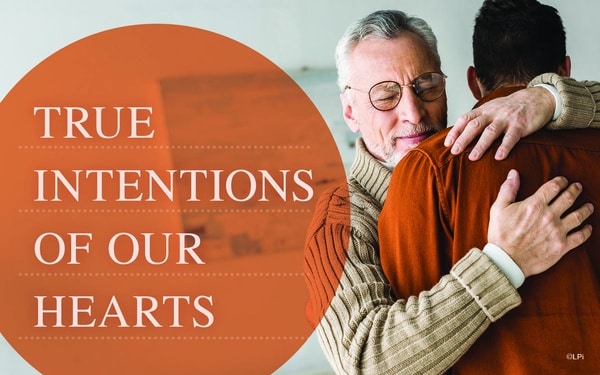Gospel Meditation
February 26, 2022

February 27, 2022
8th Sunday in Ordinary Time
What we say and how we say it reveals the true intentions of our hearts. The content and manner of our speech is a window into the recesses of our souls. Our consciences, attitudes, sentiments, weaknesses, and motives are displayed. As much as we think we can hide the truth of our lives from others, we cannot. Who we really are is not only expressed on our lips but is written on our faces. Jesus says precisely this, “For every tree is known by its own fruit.” What does the fruit of our lives say about us?
Because we like to play the game of hide and seek with ourselves, in pretending that we are hiding we deflect attention others may give to us by becoming more critical of others. After all, the more time one can spend analyzing others’ behavior the less time one has to look at his or herself. Often, the behaviors we abhor most in others are the very ones we are guilty of ourselves. We just don’t know it yet. The more we put ourselves in the role of a judge, the more satisfaction and control we seem to achieve. Yet, what about ourselves? In focusing our attention on the beams in others’ eyes, the aridity and barrenness of our lives goes unchecked. St. Ambrose reminds us that “no one heals himself by wounding another.” Bringing our brothers and sisters down by being overly critical, serves no positive purpose.
But the one who knows how easy it is to fall into sin and weakness and how quickly errors in judgment can be made, knows the depth of true compassion, mercy, and kindness. Having recognized our own poor choices, misguided opinions, negative emotions, and ability to do horrendous things, we can be more sympathetic and understanding of where others may be. We are designed to be mentors and guides to one another. In walking the journey together, we can help each other become the best we can be. Humility is the order of the day and the primary virtue that prevents us from being hypocrites.
©LPi
MEDITACIÓN EVANGÉLICO (Gospel Meditation)

27 de febrero de 2022
8º Domingo del Tiempo Ordinario
Antes de llegar al Miércoles de Ceniza e iniciar la Cuaresma, continuamos escuchando este domingo una serie de imágenes para enseñarnos lo que es la coherencia entre la fe y la vida. Si recordamos bien, el domingo pasado, el Señor dejó claro las reglas para una vida cristiana más justa y humana. Eso de amar a los enemigos y hacer el bien, no todos lo comprendemos y llevamos a cabo.
Ahora, Jesús usa esta comparación con la siguiente pregunta. “Puede un ciego guiar a otro ciego? Ciertamente caerán ambos en algún hoyo” (Lucas 6,39). Un ciego mal acompañado de seguro tropezará y caerá al precipicio. Estas parábolas llenas de sabiduría son el corazón del Evangelio. ¿Cómo comprender esta parábola? ¿Cómo ponerla en práctica? La siguiente enseñanza es lo referente a la paja en el ojo ajeno. Se refiere a evitar las malas intenciones o la critica a los demás. Dejar de hablar de los demás es un proceso de toda la vida. La corrección fraterna en la familia y en la sociedad lleva mucho de la educación cristiana y civil. Es decir, que, si se aplican las enseñanzas del Evangelio, se darán frutos buenos; y si no se aplican, el fruto es lo contrario. “Así, el hombre bueno saca cosas buenas del tesoro que tiene en su corazón, mientras que el malo, de su fondo malo saca cosas malas. La boca habla de lo que está lleno su corazón” (Lucas 6,45). Solo queda escuchar la Palabra de Dios y aplicarla en la vida, porque como se expresa la persona, da a conocer quién es.
©LPi
